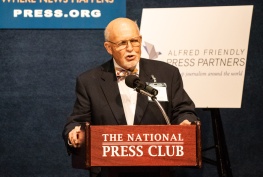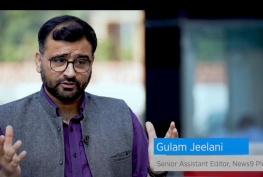Gilbert Bailón, editor of the St. Louis Post-Dispatch and a member of the Friendly Fellows Board of Advisers, recently accepted the National Press Foundation’s Benjamin C. Bradlee Editor of the Year Award at a ceremony in Washington. The honor recognized the exceptional work done by him and the Post-Dispatch staff on the unfolding events in 2014-15 in Ferguson, Missouri. Here is his acceptance speech:
“Our coverage in Ferguson began as an inherently local story of a fatal police shooting on an August afternoon.
But it quickly transformed into a national event depicted by street protests, which later gave rise to looting, burning and violent unrest that shocked the nation, much less the people in our Midwestern hometown.
A century-old suburb of 21,000 people in a metro area of almost 3 million became burnished as #Ferguson to much of the nation and world.
The images of violence, pain, anger and intense police presence became a powerful national wake-up call. Then other police-related killings and alleged brutality fixed national scrutiny on long-festering societal problems.
Issues involved the criminal justice system, policing tactics, concentrated poverty, race relations, political disenfranchisement and inequities in educational and economic opportunity.
Ferguson is no outlier. But it has been elevated as a symbol and a call to action.
The award tonight is recognition for every journalist and support staffer in the St. Louis Post-Dispatch newsroom.
I have never been involved with such a volatile local news story whose impact will project for generations.
The Post-Dispatch journalists are forever changed, too.
Their professionalism and dedication have demonstrated the best of local journalism and why it matters.
The staff worked bravely day and night when the protests and tension were at their apex. They donned bulletproof vests, tear gas masks and were assaulted in the streets and had their equipment stolen.
They were pepper-sprayed by police. One photographer was chased out of the backyard of a Ferguson homeowner at gunpoint.
Ferguson also re-established how newspapers serve as real-time news providers across multiple platforms: print, online, video, blogs, multimedia and social media.
Our community has relied on our journalists for the last six months. Our journalists are the heroes tonight.
The violent unrest has subsided. But the deep polarization and intensity of the emotions and opinions continue to roil.
The gulfs are huge. In phone calls, letters to the editor, emails and social media, we all have been subject to racist, vile and threatening language.
At the height, police were stationed outside one reporter’s house because of threats.
The slings and arrows came from all angles and political persuasions.
Some said we kowtow to the elected leadership. Others say they would cancel their subscriptions if we continue to publish Ferguson-related stories on the front page because the story is over for them.
But the Post-Dispatch journalists have stayed focused and continue their important work despite an emotional public milieu.
Ferguson and its outgrowth of issues have validated the essentiality of a vigorous news media.
It defies the myth that so-called legacy media have become obsolete.
Ferguson has reaffirmed our vital role to tell human stories, to find facts, to investigate, to speak with a strong editorial voice and to hold public institutions accountable.
That work will endure for years in the Post-Dispatch newsroom.
As our region works to rebound, St. Louis Post-Dispatch journalists will remain indispensable to our community.
On their behalf, I accept this award.”




